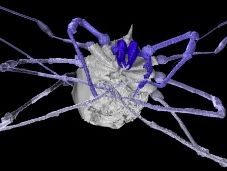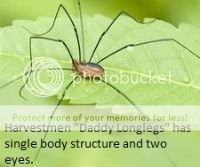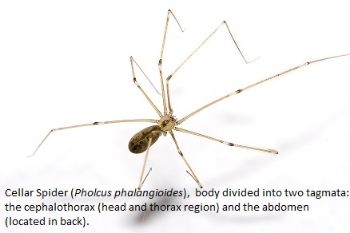The Evolution of Daddy Longlegs

 A rare fossil find in eastern France allows researchers to trace the heritage of harvestmen (Hastocularis argus), most frequently known as "daddy longlegs," back 305 million years. The fossil revealed that at one point harvestmen had two sets of active eyes. One set close to the center of the head, and another on the sides of the head. Modern day harvestmen only have one set of eyes, which kept an ongoing debate about whether this arachnid's origins were that of a spider.
A rare fossil find in eastern France allows researchers to trace the heritage of harvestmen (Hastocularis argus), most frequently known as "daddy longlegs," back 305 million years. The fossil revealed that at one point harvestmen had two sets of active eyes. One set close to the center of the head, and another on the sides of the head. Modern day harvestmen only have one set of eyes, which kept an ongoing debate about whether this arachnid's origins were that of a spider. The fossil presents evidence that while ancient harvestmen shared lineage, they were not spiders. University of Manchester paleontologist Russell Garwood concluded, "Although they have eight legs, harvestmen are not spiders. They are more closely related to another arachnid, the scorpion." To provide further evidence towards this evolutionary discovery, scientists set out to discover if any genetic remnants remained for the 'lost' pair of eyes. Indeed, there remains dormant genetic coding for an additional set of eyes in the modern harvestmen.
The number of eyes is not the only physical feature that separates harvestmen from spiders, but it was the last lingering question. At a quick glance, the harvestmen superficially shares similarities to the cellar spider (Pholcus phalangioides),
 which is also referred to as "daddy longlegs." They look similar to the casual observer because they both have eight exceptionally long legs. However, harvestmen do not have the ability to produce silk for web making, unlike the cellar spider. Other differences, upon closer inspection, reveal that harvestmen have one body structure and two eyes. However, cellar spiders have the traditional spider characteristics of two body parts, or tagma, and eight eyes.
which is also referred to as "daddy longlegs." They look similar to the casual observer because they both have eight exceptionally long legs. However, harvestmen do not have the ability to produce silk for web making, unlike the cellar spider. Other differences, upon closer inspection, reveal that harvestmen have one body structure and two eyes. However, cellar spiders have the traditional spider characteristics of two body parts, or tagma, and eight eyes. Harvestmen live for about a year and die off in cold weather, and the cellar spider can live about 3 years. Despite urban myths about their nefarious nature, both the harvestmen and the cellar spider are non-biting and non-poisonous. In truth, harvestmen are a great value to gardeners, as they control unwanted insect, slug, and mite populations. The cellar spider builds its web in ceiling corners to trap common indoor nuisances like other spiders, moths, gnats, flies, and mosquitoes, which should be enough of a benefit for even the worst arachnophobe to find some semblance of tolerance.
This is Deb Duxbury, for Animal Life, reminding you to please spay or neuter your pet.
You Should Also Read:
The Flamboyant Courtship of the Peacock Spider
Meet the Furry Caterpillar
Are You Scared of Arachnids? Meet the Lifesaver!

Related Articles
Editor's Picks Articles
Top Ten Articles
Previous Features
Site Map
Follow @WildlifeWelfare
Tweet
Content copyright © 2023 by Deb Duxbury. All rights reserved.
This content was written by Deb Duxbury. If you wish to use this content in any manner, you need written permission. Contact Deb Duxbury for details.







